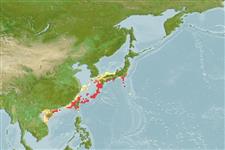Classification / Names
Nombres comunes | Sinónimos | Catalog of Fishes(Género, Especie) | ITIS | CoL | WoRMS | Cloffa
>
Pleuronectiformes (Flatfishes) >
Soleidae (Soles)
Etymology: Aseraggodes: Greek, aggos, -eos, -ous = vessel, uterus, carapace of a crab + Greek, aseros, -a, -on = to remove the appetite (Ref. 45335); cheni: Named for Dr. Jeng-Ping Chen of the National Museum of Marine Biology
and Aquarium (southern Taiwan), who collected and photographed the holotype (Ref. 74405).
More on authors: Randall & Senou.
Environment: milieu / climate zone / depth range / distribution range
Ecología
marino asociado a arrecife; rango de profundidad 14 - 48 m (Ref. 74405). Subtropical
Northwest Pacific: Taiwan and Japan
Tamaño / Peso / Age
Maturity: Lm ? range ? - ? cm
Max length : 7.5 cm SL macho / no sexado; (Ref. 74405)
Short description
Morfología | Morfometría
Radios blandos dorsales (total): 68-75; Radios blandos anales: 46 - 51. This species is distinguished by the following characters: D 68-75; A 46-51, all branched; 73-76 lateral-line scales; 36-38 vertebrae; dorsal pterygiophores anterior to 4th neural spine 13 or 14 (only 1 with 13); body depth 2.45-2.65 SL; head length 4.5-4.65 SL; caudal-peduncle length 7.7 8.2 in head length; snout length 2.4-2.65 in head length; preorbital length 2.4-2.5 in head length; eye diameter 4.65-5.25 in head length; interorbital space narrow, 11.1-14.4 in head length; tubular anterior nostril reaching edge of eye when depressed posteriorly; longest dorsal ray 1.6-1.9 in head length; caudal fin 3.15-3.55 SL; pelvic fins reaching or nearly reaching base of 4th anal ray, 1.65-1.75 in head length, 9-16 cteni on scales, not projecting very far beyond scale margins; front edge of snout and ventral edge of head with 2 rows of lappet-like cirri; color when fresh light brown with irregular white and dark brown markings, a few white ones forming broken circles, while dark brown ones may border or partly encircle the white; 2 prominent white bands on snout and 3 extending downward from lower eye; fin rays with small dark brown spots (Ref. 74405).
Life cycle and mating behavior
Madurez | Reproducción | Puesta | Huevos | Fecundidad | Larva
Randall, J.E. and H. Senou, 2007. Two new soles of the genus Aseraggodes (Pleuronectiformes: Soleidae) from Taiwan and Japan. Zool. Stud. 46(3):303-310. (Ref. 74405)
IUCN Red List Status (Ref. 130435)
Human uses
Más información
Nombres comunesSinónimosMetabolismoDespredadoresEcotoxicologíaReproducciónMadurezPuestaAgregación para la puestaFecundidadHuevosEgg development
Age/SizeCrecimientoLength-weightLength-lengthLength-frequenciesMorfometríaMorfologíaLarvaDinámica larvariaReclutamientoAbundanciaBRUVS
ReferenciasAcuiculturaPerfil de acuiculturaRazasGenéticaElectrophoresesheritabilidadEnfermedadesProcesamientoNutrientsMass conversion
ColaboradoresImágenesStamps, Coins Misc.SonidosCiguateraVelocidadTipo de nataciónSuperficie branquialOtolitosCerebrosVisión
Herramientas
Special reports
Download XML
Fuentes de Internet
Estimates based on models
Preferred temperature (Ref.
123201): 19.3 - 26.5, mean 24.4 °C (based on 30 cells).
Phylogenetic diversity index (Ref.
82804): PD
50 = 0.5000 [Uniqueness, from 0.5 = low to 2.0 = high].
Bayesian length-weight: a=0.00977 (0.00473 - 0.02021), b=3.07 (2.90 - 3.24), in cm total length, based on LWR estimates for this (Sub)family-body shape (Ref.
93245).
Nivel trófico (Ref.
69278): 3.5 ±0.5 se; based on size and trophs of closest relatives
Resiliencia (Ref.
120179): Alto, población duplicada en un tiempo mínimo inferior a 15 meses (Preliminary K or Fecundity.).
Fishing Vulnerability (Ref.
59153): Low vulnerability (10 of 100).
